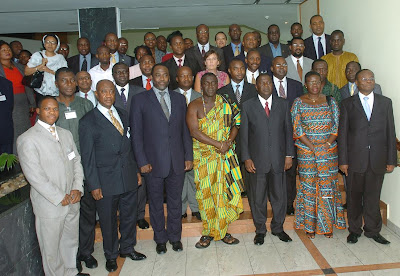It seems to me that the day breaks much earlier in
Ghana than
Nigeria. It was some minutes to six in the morning by my time but looking out of the window revealed that the day was already bright and by some minutes past six, the morning sun was coming out. I had to jump out of the bed to confirm the time from the receptionist. This was another surprise and the first for the day.
Bright was my first visitor as he came to take me to their house before I started leaving for the venue of the event. I also remembered I did not pick some documents I needed from Nigeria and thus had to quickly use the internet to print out some documents from my email box.
I chartered a cab to take us directly to the La Palm Royal Beach Hotel, venue of the event. We spent about an hour in the hold-up which immediately brought back the memories of home, especially Lagos to me.
I got to the venue about an hour behind schedule but discovered that the event has not started as the Ghanaian Vice-President, expected to open the event, was still being expected.
 After about 30 minutes, we were all informed of his arrival and had to stand up to welcome him. He came with the Minister for Communication and a High Chief who eventually chaired the opening session.
After about 30 minutes, we were all informed of his arrival and had to stand up to welcome him. He came with the Minister for Communication and a High Chief who eventually chaired the opening session.
Alhaji Aliu Mahama, Ghanaian Vice-President, while delivering his opening speech called for the early implementation of Africa’s broadband infrastructure program so as to facilitate the continent’s development with the use of ICT. He noted that E-Governance offers African countries an opportunity to step-up their industrial development and transform their economies into service-driven and high value-added information economies able to compete in the global market.
Dr. Ekwow Spio-Garbrah, the CEO of the Commonwealth Telecommunications Organisation, in his own welcome address gave a critical overview and objectives of E-Governance. While noting that without good governance, the “e” in e-governance is useless, he stressed the importance and continuous relevance of old ICTs such as radio in ensuring the interaction between government, its agencies and the citizens.
 Over the three days event, the different presentations showcased best practices of successful e-government initiatives from different parts of the world and also strategised on how African countries can tap into its potentials.
Over the three days event, the different presentations showcased best practices of successful e-government initiatives from different parts of the world and also strategised on how African countries can tap into its potentials.
One of the projects showcased was the Ghana Community Network Services (GCNet), a public private partnership initiative between the government of Ghana and other partners, which has made the inspection of goods at the different ports in Ghana and its clearance much easier. This has reduced the time it takes to clear goods at the port and has also led to increased revenue for the government. This is one of the examples of successful e-governance projects in the world.
Another project was the Canadian e-Government initiative. Mr. Jacques Bouchard, Senior Policy Advisor, Canadian e-Policy Resource Center, noted the enthusiasm and commitment of the Canadian government to see that the initiative succeeds. This he said was very important during the implementation of the project. He shared the lessons and challenges of the project with all the participants.
Another project was e-Macao Project which was an example used by Dr. Tomaz Janowski, Head, Center for Electronic Governance, United Nations University International Institute for Software Technology, during his presentation titled “Building a Foundation for Sustainable Electronic Government: From Experience, to Lessons, to a Framework.” The project had a two-year timeline to establish a good foundation for Electronic Government development in Macao through readiness assessment, software research and development and technology training of the government IT staff. The implementation was divided into five phases of Survey (assess the readiness for e-government, Development (develop e-government systems), Dissemination (raise awareness, transfer project experience), Training (build capacity for government workforce) and Research (conduct e-government research and problem-solving) with the deadline for the project met.
One very interesting thing to note after all the sessions was the rate of feedbacks and discussions. Most of the time, the Chair of each session had to cut these short in order to keep to the time limit of each of the sessions. This is an indication that the participants were following the presenters and are eager to contribute ideas that will lead to the e-development of the continent. This is also an indicator that a future edition of the event is necessary to evaluate the progress made from the outcome of this particular edition.





